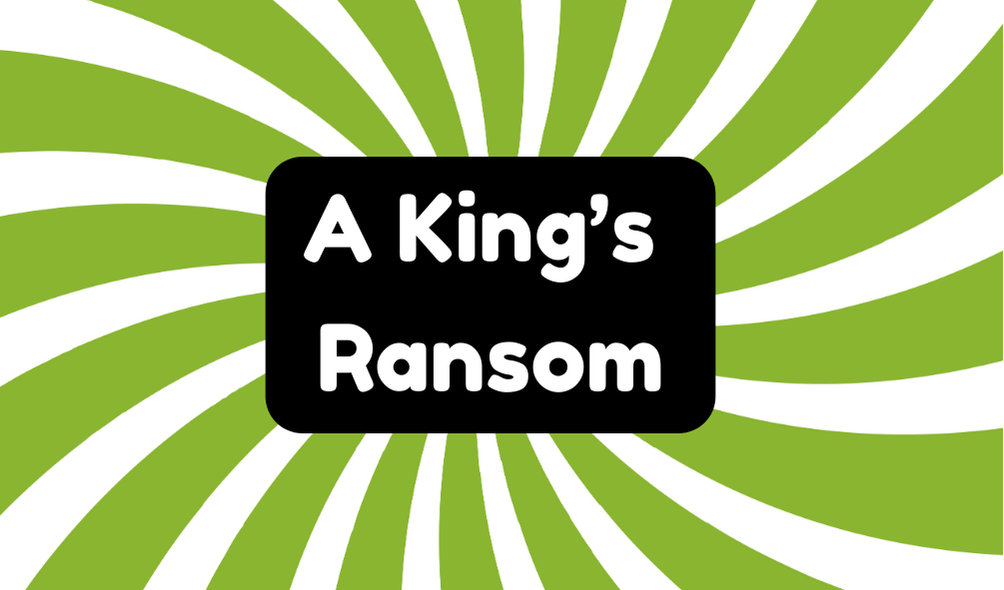The phrase “a king’s ransom” describes an extremely high amount of money, tracing back to medieval times when the wealth of a ruler dictated the worth of a human life. Initially relating to ransoms for captured kings, it later took on figurative meanings. Today, it often symbolizes luxury and excessive expenses, reflecting societal views on wealth. This term invites critical examination of how value is perceived and signifies the ongoing relevance of wealth discussions in modern society, revealing deeper insights.
Synonyms
When discussing the phrase “a king’s ransom,” it is useful to contemplate its synonyms, which can offer greater insight into its meaning. Understanding wealth alternatives enriches the comprehension of this term, leading to the following expressions:
- Fortune
- Treasure trove
- Windfall
These money expressions illustrate how language evolves to encapsulate the concept of vast wealth. While choices in language may reflect societal values, it’s critical to recognize that mere words can sometimes obscure the true nature of value. Consequently, engaging with these synonyms can prompt a deeper dialogue about the implications of wealth, even in a metaphorical context.
Example of Sentences
The concept of “a king’s ransom” is frequently employed in everyday conversation to emphasize the enormous sums of money involved in various contexts. This phrase often appears in the following examples:
- “The new tech gadget sold for a king’s ransom, highlighting its market demand.”
- “His lawsuit settlement was a king’s ransom, sparking debates about fairness in monetary references.”
- “Her wedding expenses approached a king’s ransom, causing her to question societal expectations.”
These examples provide context, illustrating how the phrase serves as a vivid metaphor for lavish expenditures, revealing the underlying skepticism about the true value placed on money in contemporary society.
Origin
Rooted in historical practices of medieval warfare, the phrase “a king’s ransom” initially referred to the exorbitant sum of money demanded for the release of a captured monarch. Its origins illustrate a historical context where wealth dictated a king’s value in captivity. As time passed, the linguistic evolution transformed this term from a literal demand into a figurative expression for any large sum. By the early 16th century, it had taken on a broader meaning, revealing a collective understanding of wealth and power. This evolution invites reflection on how language adapts to cultural shifts while retaining vestiges of its past.
Collocations
Collocations related to the phrase “a king’s ransom” reveal the various contexts in which this idiom is frequently employed. Understanding these phrases sheds light on both financial implications and historical significance. Examples include:
- “Paying a king’s ransom”
- “Costing a king’s ransom”
- “Valued at a king’s ransom”
Such collocations demonstrate how the idiom expresses exorbitant financial demands and captures the struggle for wealth that has persisted through history. While often used lightly in modern contexts, it is critical to acknowledge the serious origins tied to the lives of individuals once held for extraordinary sums.
How to Use in Everyday Language
Using the phrase “a king’s ransom” in everyday language requires a thoughtful approach to ascertain its meaning is conveyed accurately. This idiom often arises in financial contexts, where individuals might exaggerate costs or expenses. Caution is warranted, as it may lead listeners to misconstrue the intended amount. For instance, describing a luxury item as costing “a king’s ransom” could evoke tangential associations with nobility and splendor. Consequently, while utilizing such expressions can enhance communication, one must ascertain the implications align with the message. Clarity should prevail, reminding speakers that idioms are tools best wielded with precision and intent.
Why Is It Still Relevant Today?
Why does the phrase “a king’s ransom” continue to hold significance in contemporary language? Its roots in financial terminology resonate in today’s discussions about wealth and economic power. The term captures cultural significance, echoing historical practices of bargaining and value assessment. Even as society evolves, the concept of exorbitant sums remains relevant—particularly in debates surrounding wealth disparities or exorbitant costs. However, one must consider if these references merely romanticize historical practices, distracting from contemporary realities. Ultimately, “a king’s ransom” serves as a linguistic bridge, helping to frame discussions about value, wealth, and the human experience in a modern context.







